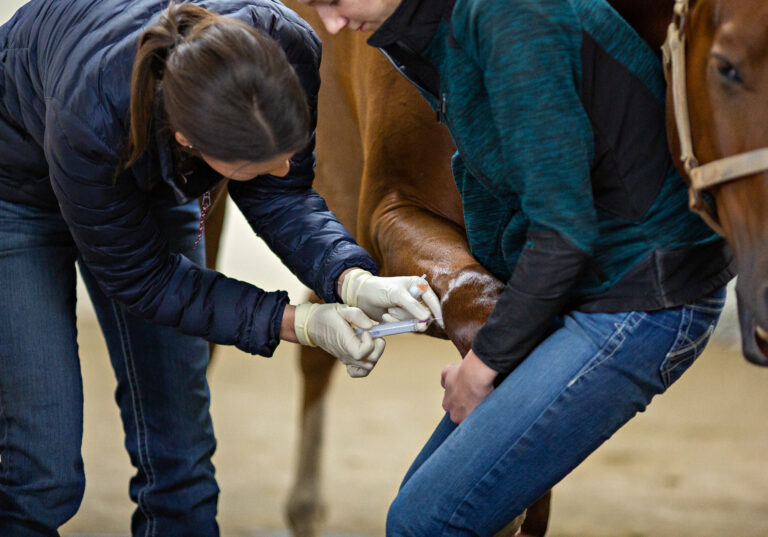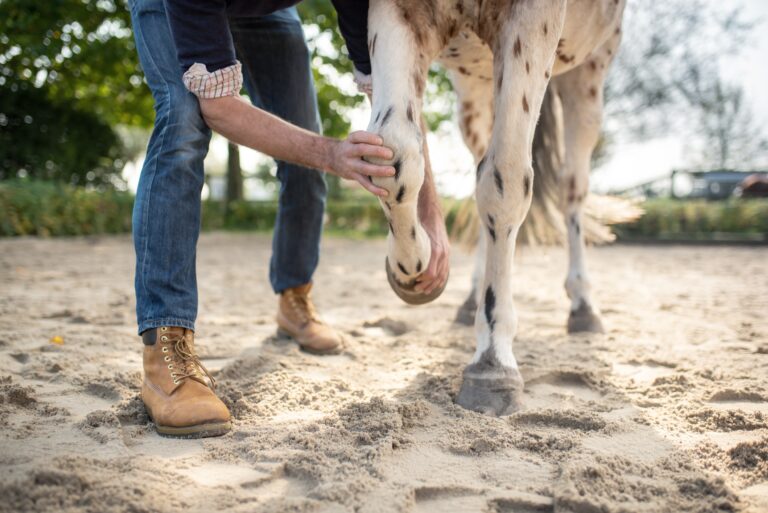
Septic arthritis in horses is both life- and career-threatening. Aggressive treatment is important to curtail damage within the joint and help resolve the infection. A key strategy is to flush the joint copiously with isotonic fluids and debride as necessary; multiple lavage fluid options are available. Based on a human in vitro joint lavage study that showed eradication of Streptococcus epidermitis biofilm within one minute of exposure to 0.05% chlorhexidine exposure, researchers in Portugal evaluated how this protocol might work in horses with septic arthritis.
Study Population
Their retrospective study included 10 adult horses with synovial sepsis and a poor prognosis due to financial constraints by owners or the presence of established infection for several days. Multiple joints were affected: metacarpophalangeal, tarsocrural, radiocarpal and intercarpal, distal interphalangeal, and the navicular bursa. These horses had previously been treated with needle or arthroscopic lavage, with referral time ranging from 1-20 days with a mean of 8.3 days. Positive cultures were present in 60%; the researchers used Pen/Gen for systemic therapy until culture and sensitivity results came back.
0.05% Chlorhexidine Solution
In the study, researchers lavaged septic joints with 0.05% chlorhexidine solution in Lactated Ringer’s for 15 minutes. Human studies have shown that chlorhexidine elicits less risk of wound complications than povidone-iodine. While chlorhexidine is considered chondrotoxic, its effects depend on concentration and exposure time. In one study, “cartilage exposure to 0.05% chlorhexidine solution for one minute reduced 99% of bacteria without impairing healthy cartilage metabolism.” Exposure for longer than one hour was associated with significant changes.
Endoscopic surgery is the preferred treatment method, but needle lavage with 14-gauge needles might also be acceptable in cases of financial constraints.
Study Results
As expected, lameness persisted postoperatively, possibly due to chemical synovitis and capsulitis in the first 24-96 hours following cartilage exposure to chlorhexidine. Treatment aggravated clinical signs in horses with preexisting osteoarthritis. The researchers implemented regional limb perfusion in all the cases.
Eight of the 10 horses survived for more than 12 months. One horse was euthanized within three days and another within three months, due to lack of sepsis resolution. Four of the eight were retired as pasture sound, three returned to light work, and one returned to Grand Prix dressage.
Final Thoughts
In summary, the authors said treatment with a 0.05% chlorhexidine flush is a salvage procedure when financial resources are limited or when horses present with ongoing clinical infections that have a poor prognosis.
Reference
Rosa T, Magalhaes M, Santos, et al. Outcome and survival of septic arthritis treated with 0.05% chlorhexidine solution: A description of 10 cases. ESS Open Archive September 20, 2024; DOI: 10.22541/au.172683419.95096143/v1
Related Reading
- Mesenchymal Stromal Cells for Sepsis in Horses
- Retrospective Study on Future Racing Performance of Foals With Septic Arthritis
- What We Know About Septic Bicipital Bursitis in Horses
Stay in the know! Sign up for EquiManagement’s FREE weekly newsletters to get the latest equine research, disease alerts, and vet practice updates delivered straight to your inbox.




